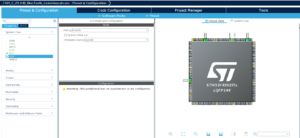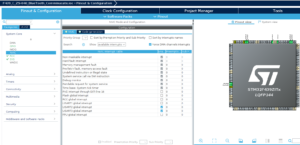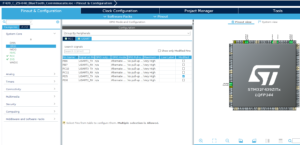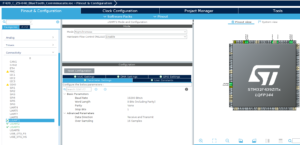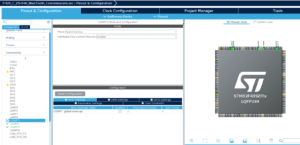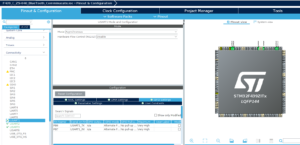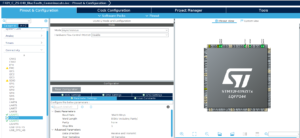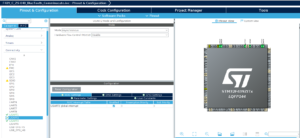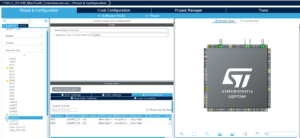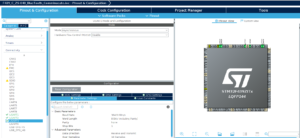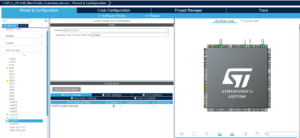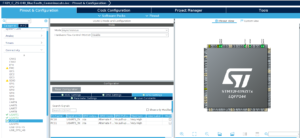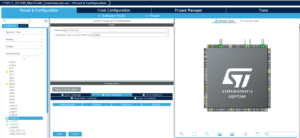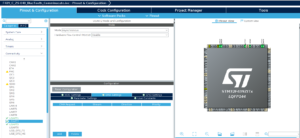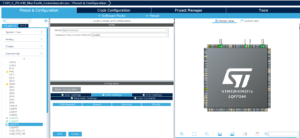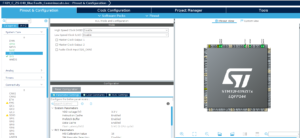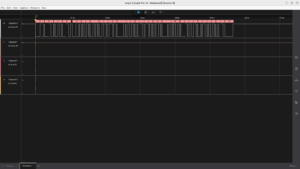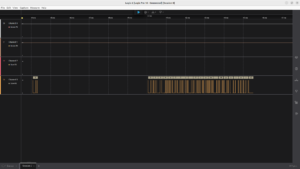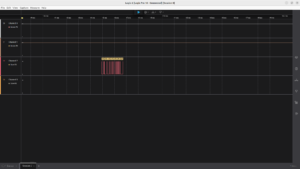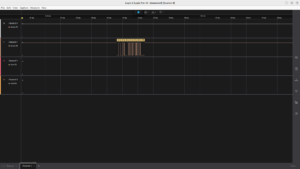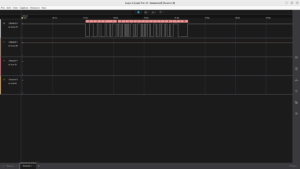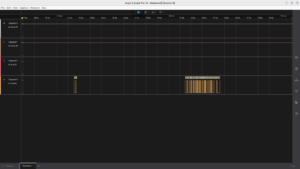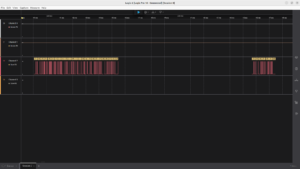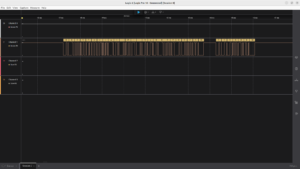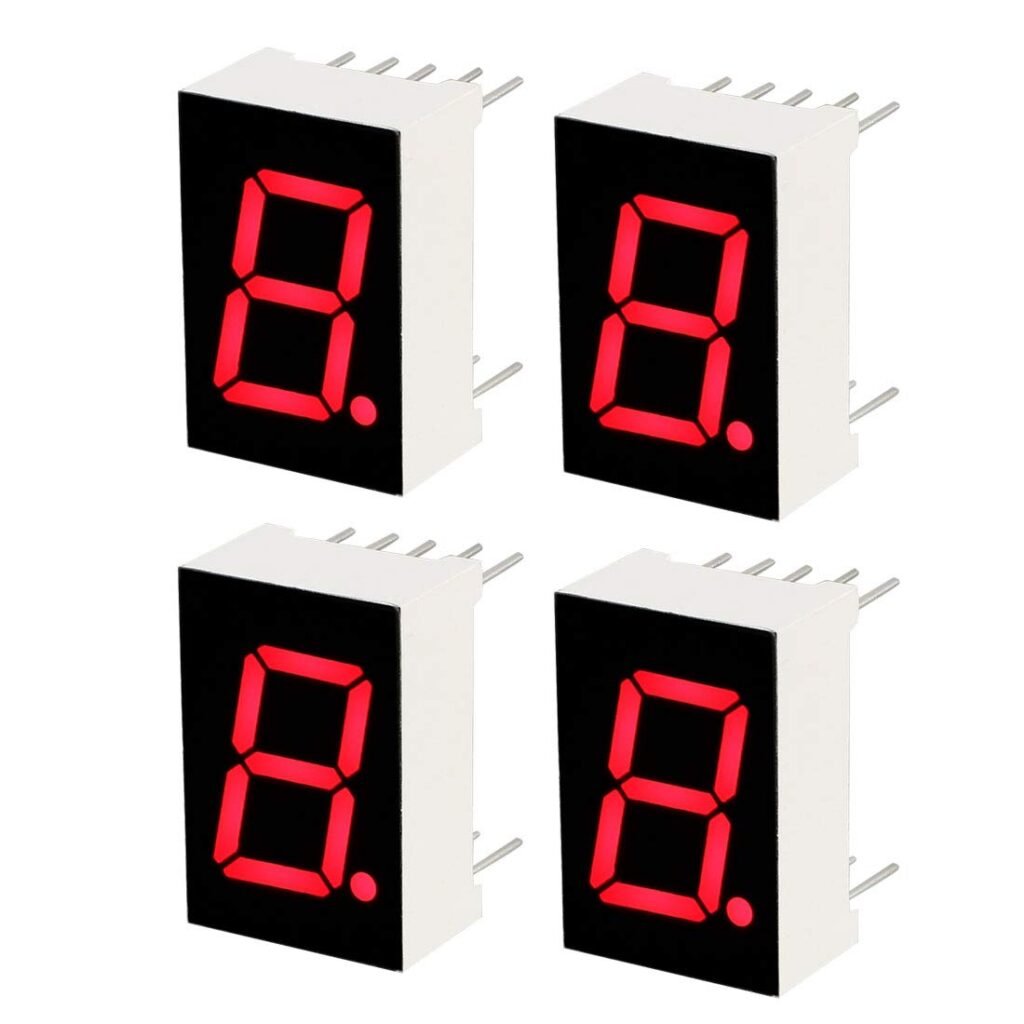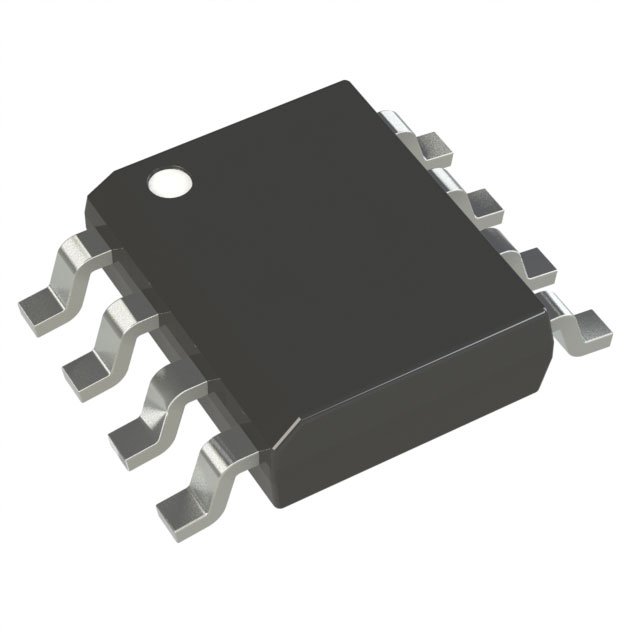Introduction
In this tutorial, we shall be configuring Bluetooth Devices to Communicate using DMA and the knowledge gained from our previous tutorial How to setup and configure a ZS-040 HC-05 Bluetooth transceiver to create a mini application which will send messages back and forth between a master and a slave Bluetooth device. This will require two sets of hardware, not only for the Bluetooth devices themselves, but also 2 Identical Nucleo Boards, 2 ZS-040 (Master/Slave), and two FTDI devices for USART output on 2 different dumb terminal emulators.
Materials List
- FTDI to USB
- HS-040 Bluetooth Master/Slave Module
- Breadboards Kit Include 2PCS 830 Point 2PCS 400 Point Solderless Breadboards
- NUCLEO-F439ZI
- Logic 8 – Saleae 8-Channel Logic Analyzer
FTDI Pinouts
FTDI to USB Pinout from right to left. The FTDI module is needed to convert the USART RX/TX signals into RS-232/USB such that you can interface with a dumb terminal.
- Pin 1 – GND
- Pin 2 – CTS
- Pin 3 – VCC
- Pin 4 – TX
- Pin 5 – RX
- Pin 6 – DTR
- USB Mini – Connect to PC via USB cable
Make sure the jumper is set for 5v or 3v which ever is being used to power the FTDI device. If we look below at the schematic, it is showing in this case as 5v. Also, validate that any hardware flow control is turned off.
If the dumb terminal emulator you are using has hardware flow control, you probably will not see the response to the <Enter> key being pressed and therefore the master Bluetooth device will not proceed to get configured.
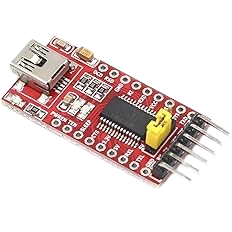
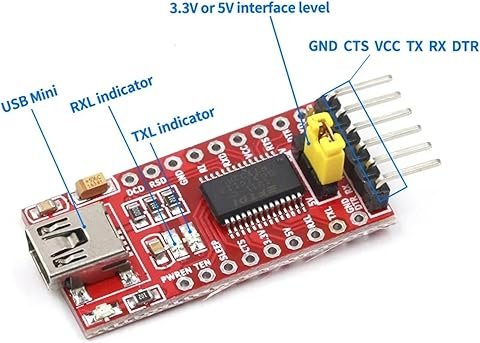
ZS-040 HC-05 Bluetooth Master/Slave Transceiver
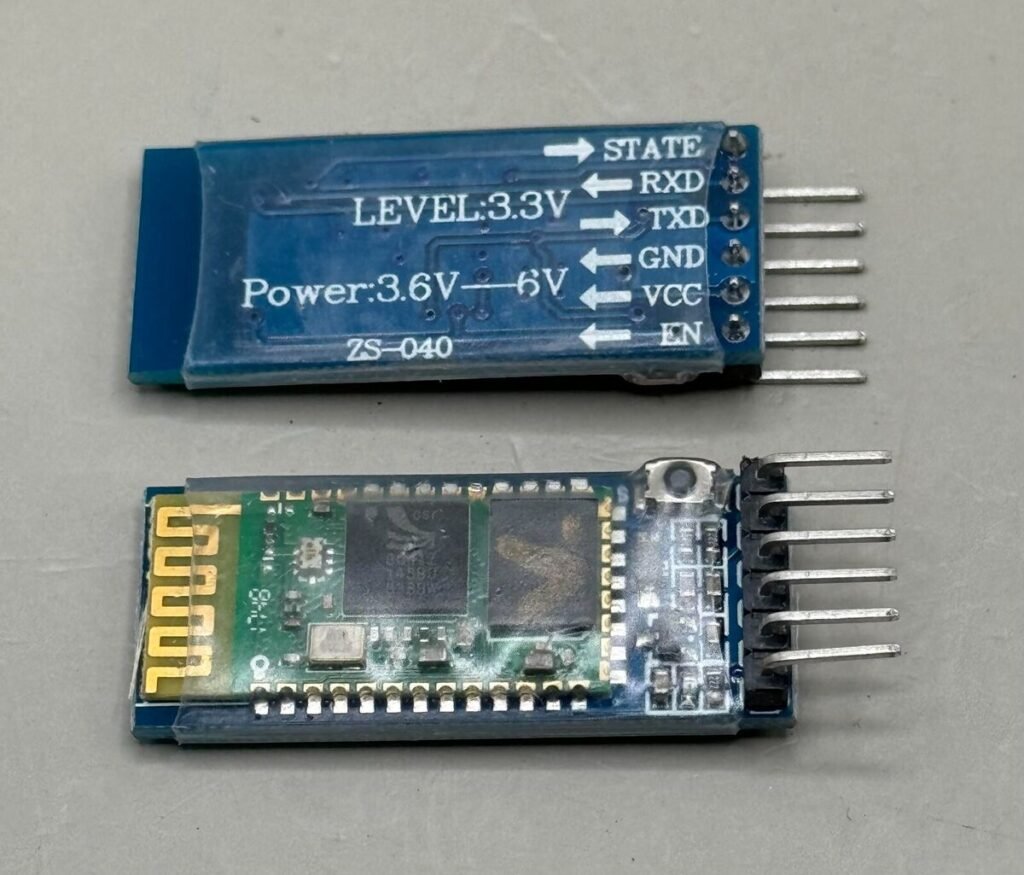
Schematic
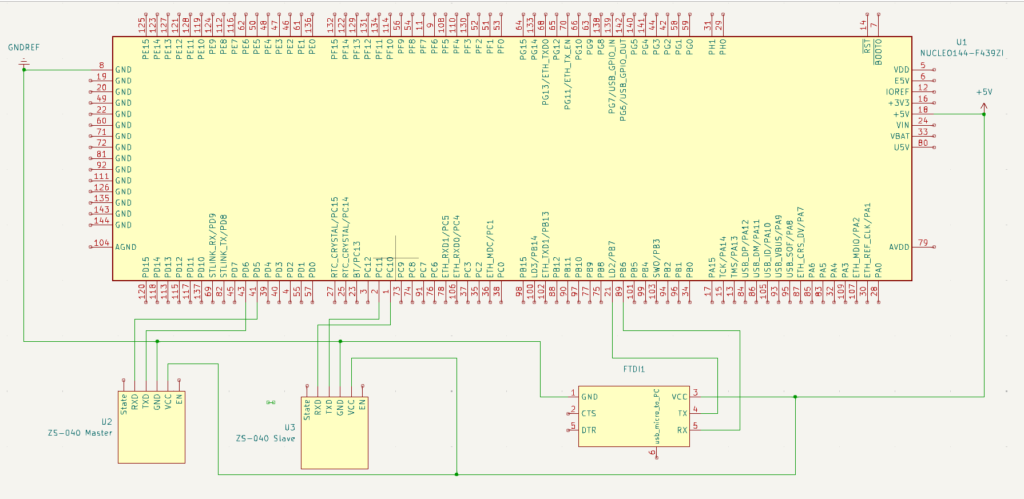
When setting up the Master Breadboard, only wire the U2/Master Bluetooth device. When setting up the Slave Breadboard, only wire the U3/Slave Bluetooth device. They need to be on difference breadboards to be able to communicate, because that’s how the code is written. If plugged and wired into the same breadboard with the same MCU, the Bluetooth devices will pair with each other but the code will not function correctly.
During Initialization, the MCU serial number will be used to indicate which board is the master and which is the slave. You’ll need to update the code to match your boards unique serial number. Line 444 in the example below uses the captured UUID/Serial # from the MCU to determine which is master or slave. We only need uid[0] which is the first part of the UUID, which is unique. The other bytes are production information, which is NOT unique. To get a better unique serial number using all 96 bits that is stored on the boards, visit my tutorial on: STM32XXX – Get UUID Unique Serial Number from Board
The USART2 & USART3 are configured from the MCU -> Bluetooth device where (MCU) TX-> (Bluetooth) Rx and (MCU) Rx-> (Bluetooth) Tx. The same methodology goes for USART1 which is Tx->Rx and Rx->Tx
char UUID[80] = {'\0'};
uint32_t uid[3] = {0x00};
uid[0] = HAL_GetUIDw0();
uid[1] = HAL_GetUIDw1();
uid[2] = HAL_GetUIDw2();
uint8_t lot1[4];
uint8_t lot2[4];
uint8_t *ptr;
ptr = (uint8_t *)&uid[1];
for (uint8_t i = 0; i < 4; i++) {
lot1[i] = ptr[i];
}
ptr = (uint8_t *)&uid[2];
for (uint8_t i = 0; i < 4; i++) {
lot2[i] = ptr[i];
}
sprintf(UUID, "0x%8.8lx:%c%c%c%c:%c%c%c%c", uid[0], lot1[0], lot1[1], lot1[2], lot1[3],
lot2[0], lot2[1], lot2[2], lot2[3]);
sprintf(serialNo, "0x%8.8lx", uid[0]);
printf("UUID: %s\r\n", UUID);
if (uid[0] == 0x0029002f) { // Change this value to be the ID that is returned by your MCU
printf("Master Init\r\n");
curRole = MASTER;
masterPhase = M_PHASE_0;
waitingOnResponse = false;
} else {
printf("Slave Init\r\n");
curRole = SLAVE;
slavePhase = S_PHASE_0;
waitingOnResponse = false;
waitingOnMaster = true;
}NOTE: The above example code will work for the most part, but there is a better way and in this example you can read more about it: How to get the unique ID of an STM32 Board using HAL_GetUIDwX
Pinouts & Configurations
Exploring the Source Code
main.h
/* USER CODE BEGIN Header */
/**
******************************************************************************
* @file : main.h
* @brief : Header for main.c file.
* This file contains the common defines of the application.
******************************************************************************
* @attention
*
* Copyright (c) 2024 STMicroelectronics.
* All rights reserved.
*
* This software is licensed under terms that can be found in the LICENSE file
* in the root directory of this software component.
* If no LICENSE file comes with this software, it is provided AS-IS.
*
******************************************************************************
*/
/* USER CODE END Header */
/* Define to prevent recursive inclusion -------------------------------------*/
#ifndef __MAIN_H
#define __MAIN_H
#ifdef __cplusplus
extern "C" {
#endif
/* Includes ------------------------------------------------------------------*/
#include "stm32f4xx_hal.h"
/* Private includes ----------------------------------------------------------*/
/* USER CODE BEGIN Includes */
/* USER CODE END Includes */
/* Exported types ------------------------------------------------------------*/
/* USER CODE BEGIN ET */
/* USER CODE END ET */
/* Exported constants --------------------------------------------------------*/
/* USER CODE BEGIN EC */
/* USER CODE END EC */
/* Exported macro ------------------------------------------------------------*/
/* USER CODE BEGIN EM */
/* USER CODE END EM */
/* Exported functions prototypes ---------------------------------------------*/
/* USER CODE BEGIN EFP */
/* USER CODE END EFP */
/* Private defines -----------------------------------------------------------*/
/* USER CODE BEGIN Private defines */
void _Error_Handler(const char *, int);
#define Error_Handler() _Error_Handler((const char *)__FILE__, __LINE__)
#define REDIRECT_PRINTF
/* USER CODE END Private defines */
#ifdef __cplusplus
}
#endif
#endif /* __MAIN_H */
main.c
This code performs the redirection of output from printf to the USART1
/* Private user code ---------------------------------------------------------*/
/* USER CODE BEGIN 0 */
#ifdef REDIRECT_PRINTF
#define PUTCHAR_PROTOTYPE int __io_putchar(int ch)
#endif
#ifdef REDIRECT_PRINTF
/**
* @brief Retargets the C library printf function to the USART.
* @param None
* @retval None
*/
PUTCHAR_PROTOTYPE
{
/* Place your implementation of fputc here */
/* e.g. write a character to the USART1 */
HAL_UART_Transmit(&huart1, (uint8_t *)&ch, 1, 0xFFFF);
return ch;
}
#endifThis function processMaster() handles messages to and from the slave. It’s a state machine and as we progress through the message exchange, it changes the state we are in until we are done. Here we are processing the completed message.
We will also be using code wrapped in the #ifdef ASCII for this tutorial. The size of the payload will be included in the prefix of each message in ASCII format. The size will be converted from int16_t type value to ASCII, as shown on the highlighted lines below.
void processMaster() {
HAL_StatusTypeDef halStatus = HAL_OK;
char masterRxBuffer[MAX_BUFSIZE];
char obuf[128];
uint16_t len = 0;
switch (masterPhase) {
case M_PHASE_0: {
if (!messageSent) {
sprintf(obuf, "Hello from Master");
printf("Master TxData: %s\r\n", obuf);
len = strlen(obuf) + 1;
#ifdef BINARY
halStatus = HAL_UART_Transmit(&huart2, (uint8_t *)&len, sizeof(uint16_t), 0xffff);
#endif
#ifdef ASCII
char bufLen[80];
sprintf(bufLen, "%4.4d", len);
halStatus = HAL_UART_Transmit(&huart2, (uint8_t *)&bufLen, 4, 0xffff);
#endif
halStatus = HAL_UART_Transmit(&huart2, (uint8_t *)&obuf, len, 0xffff);
if (halStatus != HAL_OK) {
Error_Handler();
}
messageSent = true;
recvdResponse = false;
} else {
if (messageSent && recvdResponse) {
ringBufferCopyAndRemove(masterRingBuf, masterRxBuffer);
printf("masterRxBuffer01: %s\r\n", (char *) masterRxBuffer);
if (strcmp("OK", masterRxBuffer) == 0) {
recvdResponse = false;
waitingOnResponse = false;
messageSent = false;
waitingOnMaster = false;
masterPhase = M_SEND_SERIAL_NO_REQUEST;
}
}
}
break;
}
case M_SEND_SERIAL_NO_REQUEST: {
if (!messageSent) {
sprintf(obuf, "Serial#?");
printf("Master TxData: %s\r\n", obuf);
len = strlen(obuf) + 1;
#ifdef BINARY
halStatus = HAL_UART_Transmit(&huart2, (uint8_t *)&len, sizeof(uint16_t), 0xffff);
#endif
#ifdef ASCII
char bufLen[80];
sprintf(bufLen, "%4.4d", len);
halStatus = HAL_UART_Transmit(&huart2, (uint8_t *)&bufLen, 4, 0xffff);
#endif
halStatus = HAL_UART_Transmit(&huart2, (uint8_t *)&obuf, len, 0xffff);
if (halStatus != HAL_OK) {
Error_Handler();
}
messageSent = true;
recvdResponse = false;
} else {
if (messageSent && recvdResponse) {
ringBufferCopyAndRemove(masterRingBuf, masterRxBuffer);
printf("masterRxBuffer02: %s\r\n", (char *) masterRxBuffer);
if (strncmp("Serial #:", masterRxBuffer, 9) == 0) {
sprintf(obuf, "Serial#: %s\r\n", masterRxBuffer + 9);
printf("Master RxData: %s", obuf);
recvdResponse = false;
waitingOnResponse = false;
messageSent = false;
waitingOnMaster = false;
masterPhase = M_PHASE_OK;
} else {
printf("Serial # string not found, masterRxBuffer[%s]\r\n", masterRxBuffer);
while(1) {
HAL_Delay(1000);
}
}
}
}
break;
}
case M_PHASE_OK: {
sprintf(obuf, "OK\r\n");
printf("Master RxData: %s", obuf);
recvdResponse = false;
waitingOnResponse = false;
messageSent = false;
waitingOnMaster = true;
masterPhase = M_DONE;
}
case M_DONE: {
break;
}
default: {
Error_Handler();
}
}
}This function processSlave() handles messages to and from the master. It’s a state machine and as we progress through the message exchange, it changes the state we are in until we are done. Here we are processing the completed message. Keep in mind that this example we have defined ASCII, or #define ASCII. Therefore any code, surrounded by #ifdef BINARY will not be included.
The size of the payload will be included in the prefix of each message in ASCII format. The size will be converted from int16_t type value to ASCII, as shown on line 311 & 313 and 347 & 349.
void processSlave() {
HAL_StatusTypeDef halStatus = HAL_OK;
char slaveRxBuffer[MAX_BUFSIZE];
char obuf[128];
int len = 0;
switch (slavePhase) {
case S_PHASE_0: {
if (waitingOnMaster && recvdResponse) {
ringBufferCopyAndRemove(slaveRingBuf, slaveRxBuffer);
printf("slaveRxBuffer: %s\r\n", (char *) slaveRxBuffer);
if (strcmp("Hello from Master", slaveRxBuffer) == 0) {
recvdResponse = false;
waitingOnResponse = false;
messageSent = false;
waitingOnMaster = false;
slavePhase = S_PHASE_OK;
}
if (strcmp("Serial#?", slaveRxBuffer) == 0) {
recvdResponse = false;
waitingOnResponse = false;
messageSent = false;
waitingOnMaster = false;
slavePhase = S_PHASE_HANDLE_SERIAL_NO_REQUEST;
}
}
break;
}
case S_PHASE_HANDLE_SERIAL_NO_REQUEST: {
if (!waitingOnMaster) {
sprintf(obuf, "Serial #: %s", serialNo);
printf("Slave TxData: %s\r\n", obuf);
len = strlen(obuf) + 1;
#ifdef BINARY
halStatus = HAL_UART_Transmit(&huart3, (uint8_t *)&len, sizeof(uint16_t), 0xffff);
#endif
#ifdef ASCII
char bufLen[80];
sprintf(bufLen, "%4.4d", len);
halStatus = HAL_UART_Transmit(&huart3, (uint8_t *)&bufLen, 4, 0xffff);
#endif
if (halStatus != HAL_OK) {
Error_Handler();
}
halStatus = HAL_UART_Transmit(&huart3, (uint8_t *)&obuf, len, 0xffff);
if (halStatus != HAL_OK) {
Error_Handler();
}
recvdResponse = false;
waitingOnResponse = false;
messageSent = false;
waitingOnMaster = false;
slavePhase = S_PHASE_OK;
}
break;
}
case S_PHASE_OK: {
if (!waitingOnMaster) {
sprintf(obuf, "OK");
printf("Slave TxData: %s\r\n", obuf);
len = strlen(obuf) + 1;
#ifdef BINARY
halStatus = HAL_UART_Transmit(&huart3, (uint8_t *)&len, sizeof(uint16_t), 0xffff);
#endif
#ifdef ASCII
char bufLen[80];
sprintf(bufLen, "%4.4d", len);
halStatus = HAL_UART_Transmit(&huart3, (uint8_t *)&bufLen, 4, 0xffff);
#endif
if (halStatus != HAL_OK) {
Error_Handler();
}
halStatus = HAL_UART_Transmit(&huart3, (uint8_t *)&obuf, len, 0xffff);
if (halStatus != HAL_OK) {
Error_Handler();
}
recvdResponse = false;
waitingOnResponse = false;
messageSent = false;
waitingOnMaster = true;
slavePhase = S_PHASE_0;
}
break;
}
case S_DONE: {
break;
}
default: {
Error_Handler();
}
}
}Keep in mind that this example we have defined ASCII, or #define ASCII. Therefore any code, surrounded by #ifdef BINARY will not be included. These two functions are the initial message parsers. Both of these functions retrieve the payload size as a prefix. In other words in the case of #define ASCII, we are capturing the first 4 bytes of data which contain the size of the payload in ASCII bytes. This is how we know on the next go around that the payload will be X bytes long. Looking at line 391 and 428, we are taking the ASCII first 4 bytes transferred and converting them into uint16_t to use as the length of the payload.
void recvMasterDeviceData() {
HAL_StatusTypeDef halStatus = HAL_OK;
if (!isMasterSizeRxcvd)
{
#ifdef ASCII
masterBytesToRcv = ((masterRxData[0]-48)*1000)+((masterRxData[1]-48)*100)+((masterRxData[2]-48)*10)+((masterRxData[3]-48));
#endif
HAL_UART_Receive_DMA(&huart2, masterRxData, masterBytesToRcv);
if (halStatus != HAL_OK) {
Error_Handler();
}
isMasterSizeRxcvd = true;
}
else {
recvdResponse = true;
ringBufferAdd(masterRingBuf, masterRxData);
memset(masterRxData, 0x00, sizeof(masterRxData));
isMasterSizeRxcvd = false;
#ifdef BINARY
HAL_UART_Receive_DMA(&huart2, (uint8_t *) &masterBytesToRcv, sizeof(uint16_t));
#endif
#ifdef ASCII
HAL_UART_Receive_DMA(&huart2, masterRxData, 4);
#endif
}
}
bool isSlaveSizeRxcvd = false;
uint16_t slaveBytesToRcv;
void recvSlaveDeviceData() {
HAL_StatusTypeDef halStatus = HAL_OK;
if (!isSlaveSizeRxcvd)
{
#ifdef ASCII
slaveBytesToRcv = ((slaveRxData[0]-48)*1000)+((slaveRxData[1]-48)*100)+((slaveRxData[2]-48)*10)+((slaveRxData[3]-48));
#endif
HAL_UART_Receive_DMA(&huart3, slaveRxData, slaveBytesToRcv);
if (halStatus != HAL_OK) {
Error_Handler();
}
isSlaveSizeRxcvd = true;
}
else {
recvdResponse = true;
ringBufferAdd(slaveRingBuf, slaveRxData);
memset(slaveRxData, 0x00, sizeof(slaveRxData));
isSlaveSizeRxcvd = false;
#ifdef BINARY
HAL_UART_Receive_DMA(&huart3, (uint8_t *) &slaveBytesToRcv, sizeof(uint16_t));
#endif
#ifdef ASCII
HAL_UART_Receive_DMA(&huart3, slaveRxData, 4);
#endif
}
}
void HAL_UART_RxCpltCallback(UART_HandleTypeDef *huart)
{
HAL_StatusTypeDef halStatus = HAL_OK;
if (huart->Instance == USART2) { // Blue Tooth Device
recvMasterDeviceData();
if (halStatus != HAL_OK) {
Error_Handler();
}
} else {
if (huart->Instance == USART3) { // Blue Tooth Device
recvSlaveDeviceData();
if (halStatus != HAL_OK) {
Error_Handler();
}
}
}
}This function HAL_UART_RxCpltCallback() is a critical function for handling USART Receive Data (RxD). We chose to setup data receiving using an Interrupt methodology with DMA. DMA will handle populating the memory with the data that is received. When all of the data has been captured, the interrupt service routine (ISR) will be called. This is why we must implement a function called: HAL_UART_RxCpltCallback(), as this is the name used by the HAL libraries to deal with the payload. Our ISR HAL_UART_RxCpltCallback will call a function and appropriately send it up to the handler: recvMasterDeviceData or recvSlaveDeviceData
void HAL_UART_RxCpltCallback(UART_HandleTypeDef *huart)
{
HAL_StatusTypeDef halStatus = HAL_OK;
if (huart->Instance == USART2) { // Blue Tooth Device
recvMasterDeviceData();
if (halStatus != HAL_OK) {
Error_Handler();
}
} else {
if (huart->Instance == USART3) { // Blue Tooth Device
recvSlaveDeviceData();
if (halStatus != HAL_OK) {
Error_Handler();
}
}
}
}Complete main.c listing
This is the complete main function that kicks everything off.
/* USER CODE BEGIN Header */
/**
******************************************************************************
* @file : main.c
* @brief : Main program body
******************************************************************************
* @attention
*
* Copyright (c) 2024 STMicroelectronics.
* All rights reserved.
*
* This software is licensed under terms that can be found in the LICENSE file
* in the root directory of this software component.
* If no LICENSE file comes with this software, it is provided AS-IS.
*
******************************************************************************
*/
/* USER CODE END Header */
/* Includes ------------------------------------------------------------------*/
#include "main.h"
/* Private includes ----------------------------------------------------------*/
/* USER CODE BEGIN Includes */
#include "stdio.h"
#include "stdbool.h"
#include "string.h"
#include "malloc.h"
#include "ringBuffer.h"
/* USER CODE END Includes */
/* Private typedef -----------------------------------------------------------*/
/* USER CODE BEGIN PTD */
typedef enum role {
UNKNOWN = 0,
SLAVE = 1,
MASTER = 2
} ROLE_t;
typedef enum masterPhases {
M_PHASE_0 = 0,
M_SEND_SERIAL_NO_REQUEST,
M_PHASE_OK,
M_DONE
} E_MPHASE_t;
typedef enum slavePhases {
S_PHASE_0 = 0,
S_PHASE_HANDLE_SERIAL_NO_REQUEST,
S_PHASE_OK,
S_DONE
} E_SPHASE_t;
/* USER CODE END PTD */
/* Private define ------------------------------------------------------------*/
/* USER CODE BEGIN PD */
#define ASCII
#ifdef NO_ASCII
#define BINARY
#else
#define ASCII
#endif
#define MAX_BUFSIZE 128
#define RING_BUFFER_CNT 5
/* USER CODE END PD */
/* Private macro -------------------------------------------------------------*/
/* USER CODE BEGIN PM */
/* USER CODE END PM */
/* Private variables ---------------------------------------------------------*/
TIM_HandleTypeDef htim1;
UART_HandleTypeDef huart1;
UART_HandleTypeDef huart2;
UART_HandleTypeDef huart3;
DMA_HandleTypeDef hdma_usart2_rx;
DMA_HandleTypeDef hdma_usart3_rx;
/* USER CODE BEGIN PV */
bool messageSent = false;
bool recvdResponse = false;
bool waitingOnResponse = false;
bool waitingOnMaster = false;
E_MPHASE_t masterPhase;
E_SPHASE_t slavePhase;
uint8_t masterRxByte;
uint8_t slaveRxByte;
uint8_t masterRxData[MAX_BUFSIZE];
uint8_t slaveRxData[MAX_BUFSIZE];
char serialNo[80];
ringBuffer_t *masterRingBuf = NULL;
ringBuffer_t *slaveRingBuf = NULL;
ROLE_t curRole = UNKNOWN;
/* USER CODE END PV */
/* Private function prototypes -----------------------------------------------*/
void SystemClock_Config(void);
static void MX_GPIO_Init(void);
static void MX_DMA_Init(void);
static void MX_USART2_UART_Init(void);
static void MX_USART3_UART_Init(void);
static void MX_USART1_UART_Init(void);
static void MX_TIM1_Init(void);
/* USER CODE BEGIN PFP */
void processMaster(void);
void processSlave(void);
/* USER CODE END PFP */
/* Private user code ---------------------------------------------------------*/
/* USER CODE BEGIN 0 */
#ifdef REDIRECT_PRINTF
#define PUTCHAR_PROTOTYPE int __io_putchar(int ch)
#endif
#ifdef REDIRECT_PRINTF
/**
* @brief Retargets the C library printf function to the USART.
* @param None
* @retval None
*/
PUTCHAR_PROTOTYPE
{
/* Place your implementation of fputc here */
/* e.g. write a character to the USART1 */
HAL_UART_Transmit(&huart1, (uint8_t *)&ch, 1, 0xFFFF);
return ch;
}
#endif
void processMaster() {
HAL_StatusTypeDef halStatus = HAL_OK;
char masterRxBuffer[MAX_BUFSIZE];
char obuf[128];
uint16_t len = 0;
switch (masterPhase) {
case M_PHASE_0: {
if (!messageSent) {
sprintf(obuf, "Hello from Master");
printf("Master TxData: %s\r\n", obuf);
len = strlen(obuf) + 1;
#ifdef BINARY
halStatus = HAL_UART_Transmit(&huart2, (uint8_t *)&len, sizeof(uint16_t), 0xffff);
#endif
#ifdef ASCII
char bufLen[80];
sprintf(bufLen, "%4.4d", len);
halStatus = HAL_UART_Transmit(&huart2, (uint8_t *)&bufLen, 4, 0xffff);
#endif
halStatus = HAL_UART_Transmit(&huart2, (uint8_t *)&obuf, len, 0xffff);
if (halStatus != HAL_OK) {
Error_Handler();
}
messageSent = true;
recvdResponse = false;
} else {
if (messageSent && recvdResponse) {
ringBufferCopyAndRemove(masterRingBuf, masterRxBuffer);
printf("masterRxBuffer01: %s\r\n", (char *) masterRxBuffer);
if (strcmp("OK", masterRxBuffer) == 0) {
recvdResponse = false;
waitingOnResponse = false;
messageSent = false;
waitingOnMaster = false;
masterPhase = M_SEND_SERIAL_NO_REQUEST;
}
}
}
break;
}
case M_SEND_SERIAL_NO_REQUEST: {
if (!messageSent) {
sprintf(obuf, "Serial#?");
printf("Master TxData: %s\r\n", obuf);
len = strlen(obuf) + 1;
#ifdef BINARY
halStatus = HAL_UART_Transmit(&huart2, (uint8_t *)&len, sizeof(uint16_t), 0xffff);
#endif
#ifdef ASCII
char bufLen[80];
sprintf(bufLen, "%4.4d", len);
halStatus = HAL_UART_Transmit(&huart2, (uint8_t *)&bufLen, 4, 0xffff);
#endif
halStatus = HAL_UART_Transmit(&huart2, (uint8_t *)&obuf, len, 0xffff);
if (halStatus != HAL_OK) {
Error_Handler();
}
messageSent = true;
recvdResponse = false;
} else {
if (messageSent && recvdResponse) {
ringBufferCopyAndRemove(masterRingBuf, masterRxBuffer);
printf("masterRxBuffer02: %s\r\n", (char *) masterRxBuffer);
if (strncmp("Serial #:", masterRxBuffer, 9) == 0) {
sprintf(obuf, "Serial#: %s\r\n", masterRxBuffer + 9);
printf("Master RxData: %s", obuf);
recvdResponse = false;
waitingOnResponse = false;
messageSent = false;
waitingOnMaster = false;
masterPhase = M_PHASE_OK;
} else {
printf("Serial # string not found, masterRxBuffer[%s]\r\n", masterRxBuffer);
while(1) {
HAL_Delay(1000);
}
}
}
}
break;
}
case M_PHASE_OK: {
sprintf(obuf, "OK\r\n");
printf("Master RxData: %s", obuf);
recvdResponse = false;
waitingOnResponse = false;
messageSent = false;
waitingOnMaster = true;
masterPhase = M_DONE;
}
case M_DONE: {
break;
}
default: {
Error_Handler();
}
}
}
void processSlave() {
HAL_StatusTypeDef halStatus = HAL_OK;
char slaveRxBuffer[MAX_BUFSIZE];
char obuf[128];
int len = 0;
switch (slavePhase) {
case S_PHASE_0: {
if (waitingOnMaster && recvdResponse) {
ringBufferCopyAndRemove(slaveRingBuf, slaveRxBuffer);
printf("slaveRxBuffer: %s\r\n", (char *) slaveRxBuffer);
if (strcmp("Hello from Master", slaveRxBuffer) == 0) {
recvdResponse = false;
waitingOnResponse = false;
messageSent = false;
waitingOnMaster = false;
slavePhase = S_PHASE_OK;
}
if (strcmp("Serial#?", slaveRxBuffer) == 0) {
recvdResponse = false;
waitingOnResponse = false;
messageSent = false;
waitingOnMaster = false;
slavePhase = S_PHASE_HANDLE_SERIAL_NO_REQUEST;
}
}
break;
}
case S_PHASE_HANDLE_SERIAL_NO_REQUEST: {
if (!waitingOnMaster) {
sprintf(obuf, "Serial #: %s", serialNo);
printf("Slave TxData: %s\r\n", obuf);
len = strlen(obuf) + 1;
#ifdef BINARY
halStatus = HAL_UART_Transmit(&huart3, (uint8_t *)&len, sizeof(uint16_t), 0xffff);
#endif
#ifdef ASCII
char bufLen[80];
sprintf(bufLen, "%4.4d", len);
halStatus = HAL_UART_Transmit(&huart3, (uint8_t *)&bufLen, 4, 0xffff);
#endif
if (halStatus != HAL_OK) {
Error_Handler();
}
halStatus = HAL_UART_Transmit(&huart3, (uint8_t *)&obuf, len, 0xffff);
if (halStatus != HAL_OK) {
Error_Handler();
}
recvdResponse = false;
waitingOnResponse = false;
messageSent = false;
waitingOnMaster = false;
slavePhase = S_PHASE_OK;
}
break;
}
case S_PHASE_OK: {
if (!waitingOnMaster) {
sprintf(obuf, "OK");
printf("Slave TxData: %s\r\n", obuf);
len = strlen(obuf) + 1;
#ifdef BINARY
halStatus = HAL_UART_Transmit(&huart3, (uint8_t *)&len, sizeof(uint16_t), 0xffff);
#endif
#ifdef ASCII
char bufLen[80];
sprintf(bufLen, "%4.4d", len);
halStatus = HAL_UART_Transmit(&huart3, (uint8_t *)&bufLen, 4, 0xffff);
#endif
if (halStatus != HAL_OK) {
Error_Handler();
}
halStatus = HAL_UART_Transmit(&huart3, (uint8_t *)&obuf, len, 0xffff);
if (halStatus != HAL_OK) {
Error_Handler();
}
recvdResponse = false;
waitingOnResponse = false;
messageSent = false;
waitingOnMaster = true;
slavePhase = S_PHASE_0;
}
break;
}
case S_DONE: {
break;
}
default: {
Error_Handler();
}
}
}
bool isMasterSizeRxcvd = false;
uint16_t masterBytesToRcv;
void recvMasterDeviceData() {
HAL_StatusTypeDef halStatus = HAL_OK;
if (!isMasterSizeRxcvd)
{
#ifdef ASCII
masterBytesToRcv = ((masterRxData[0]-48)*1000)+((masterRxData[1]-48)*100)+((masterRxData[2]-48)*10)+((masterRxData[3]-48));
#endif
HAL_UART_Receive_DMA(&huart2, masterRxData, masterBytesToRcv);
if (halStatus != HAL_OK) {
Error_Handler();
}
isMasterSizeRxcvd = true;
}
else {
recvdResponse = true;
ringBufferAdd(masterRingBuf, masterRxData);
memset(masterRxData, 0x00, sizeof(masterRxData));
isMasterSizeRxcvd = false;
#ifdef BINARY
HAL_UART_Receive_DMA(&huart2, (uint8_t *) &masterBytesToRcv, sizeof(uint16_t));
#endif
#ifdef ASCII
HAL_UART_Receive_DMA(&huart2, masterRxData, 4);
#endif
}
}
bool isSlaveSizeRxcvd = false;
uint16_t slaveBytesToRcv;
void recvSlaveDeviceData() {
HAL_StatusTypeDef halStatus = HAL_OK;
if (!isSlaveSizeRxcvd)
{
#ifdef ASCII
slaveBytesToRcv = ((slaveRxData[0]-48)*1000)+((slaveRxData[1]-48)*100)+((slaveRxData[2]-48)*10)+((slaveRxData[3]-48));
#endif
HAL_UART_Receive_DMA(&huart3, slaveRxData, slaveBytesToRcv);
if (halStatus != HAL_OK) {
Error_Handler();
}
isSlaveSizeRxcvd = true;
}
else {
recvdResponse = true;
ringBufferAdd(slaveRingBuf, slaveRxData);
memset(slaveRxData, 0x00, sizeof(slaveRxData));
isSlaveSizeRxcvd = false;
#ifdef BINARY
HAL_UART_Receive_DMA(&huart3, (uint8_t *) &slaveBytesToRcv, sizeof(uint16_t));
#endif
#ifdef ASCII
HAL_UART_Receive_DMA(&huart3, slaveRxData, 4);
#endif
}
}
void HAL_UART_RxCpltCallback(UART_HandleTypeDef *huart)
{
HAL_StatusTypeDef halStatus = HAL_OK;
if (huart->Instance == USART2) { // Blue Tooth Device
recvMasterDeviceData();
if (halStatus != HAL_OK) {
Error_Handler();
}
} else {
if (huart->Instance == USART3) { // Blue Tooth Device
recvSlaveDeviceData();
if (halStatus != HAL_OK) {
Error_Handler();
}
}
}
}
void getBoardUUID(uint32_t *uid) {
uid[0] = HAL_GetUIDw0();
uid[1] = HAL_GetUIDw1();
uid[2] = HAL_GetUIDw2();
}
/* USER CODE END 0 */
/**
* @brief The application entry point.
* @retval int
*/
int main(void)
{
/* USER CODE BEGIN 1 */
/* USER CODE END 1 */
/* MCU Configuration--------------------------------------------------------*/
/* Reset of all peripherals, Initializes the Flash interface and the Systick. */
HAL_Init();
/* USER CODE BEGIN Init */
/* USER CODE END Init */
/* Configure the system clock */
SystemClock_Config();
/* USER CODE BEGIN SysInit */
/* USER CODE END SysInit */
/* Initialize all configured peripherals */
MX_GPIO_Init();
MX_DMA_Init();
MX_USART2_UART_Init();
MX_USART3_UART_Init();
MX_USART1_UART_Init();
MX_TIM1_Init();
/* USER CODE BEGIN 2 */
printf("\x1b[2J\x1b[H"); // Clear the dumb terminal screen
printf("Hello World!!!!\r\n");
char UUID[80] = {'\0'};
uint32_t uid[3] = {0x00};
getBoardUUID(uid);
uint8_t lot1[4];
uint8_t lot2[4];
uint8_t *ptr;
ptr = (uint8_t *)&uid[1];
for (uint8_t i = 0; i < 4; i++) {
lot1[i] = ptr[i];
}
ptr = (uint8_t *)&uid[2];
for (uint8_t i = 0; i < 4; i++) {
lot2[i] = ptr[i];
}
sprintf(UUID, "0x%8.8lx:%c%c%c%c:%c%c%c%c", uid[0], lot1[0], lot1[1], lot1[2], lot1[3],
lot2[0], lot2[1], lot2[2], lot2[3]);
sprintf(serialNo, "0x%8.8lx", uid[0]);
printf("UUID: %s\r\n", UUID);
if (uid[0] == 0x0029002f) {
printf("Master Init\r\n");
curRole = MASTER;
masterPhase = M_PHASE_0;
waitingOnResponse = false;
} else {
printf("Slave Init\r\n");
curRole = SLAVE;
slavePhase = S_PHASE_0;
waitingOnResponse = false;
waitingOnMaster = true;
}
masterRingBuf = ringBufferCreate(MAX_BUFSIZE, RING_BUFFER_CNT);
slaveRingBuf = ringBufferCreate(MAX_BUFSIZE, RING_BUFFER_CNT);
#ifdef BINARY
if (curRole == MASTER) {
HAL_UART_Receive_DMA(&huart2, (uint8_t *) &masterBytesToRcv, sizeof(uint16_t));
} else {
HAL_UART_Receive_DMA(&huart3, (uint8_t *) &slaveBytesToRcv, sizeof(uint16_t));
}
#endif
#ifdef ASCII
if (curRole == MASTER) {
HAL_UART_Receive_DMA(&huart2, masterRxData, 4);
} else {
HAL_UART_Receive_DMA(&huart3, slaveRxData, 4);
}
#endif
/* USER CODE END 2 */
/* Infinite loop */
/* USER CODE BEGIN WHILE */
bool done = false;
while (!done)
{
switch (curRole) {
case MASTER: {
processMaster();
break;
}
case SLAVE: {
processSlave();
break;
}
default: {
break;
}
}
/* USER CODE END WHILE */
/* USER CODE BEGIN 3 */
}
/* USER CODE END 3 */
}
/**
* @brief System Clock Configuration
* @retval None
*/
void SystemClock_Config(void)
{
RCC_OscInitTypeDef RCC_OscInitStruct = {0};
RCC_ClkInitTypeDef RCC_ClkInitStruct = {0};
/** Configure the main internal regulator output voltage
*/
__HAL_RCC_PWR_CLK_ENABLE();
__HAL_PWR_VOLTAGESCALING_CONFIG(PWR_REGULATOR_VOLTAGE_SCALE1);
/** Initializes the RCC Oscillators according to the specified parameters
* in the RCC_OscInitTypeDef structure.
*/
RCC_OscInitStruct.OscillatorType = RCC_OSCILLATORTYPE_HSI;
RCC_OscInitStruct.HSIState = RCC_HSI_ON;
RCC_OscInitStruct.HSICalibrationValue = RCC_HSICALIBRATION_DEFAULT;
RCC_OscInitStruct.PLL.PLLState = RCC_PLL_ON;
RCC_OscInitStruct.PLL.PLLSource = RCC_PLLSOURCE_HSI;
RCC_OscInitStruct.PLL.PLLM = 8;
RCC_OscInitStruct.PLL.PLLN = 180;
RCC_OscInitStruct.PLL.PLLP = RCC_PLLP_DIV2;
RCC_OscInitStruct.PLL.PLLQ = 4;
if (HAL_RCC_OscConfig(&RCC_OscInitStruct) != HAL_OK)
{
Error_Handler();
}
/** Activate the Over-Drive mode
*/
if (HAL_PWREx_EnableOverDrive() != HAL_OK)
{
Error_Handler();
}
/** Initializes the CPU, AHB and APB buses clocks
*/
RCC_ClkInitStruct.ClockType = RCC_CLOCKTYPE_HCLK|RCC_CLOCKTYPE_SYSCLK
|RCC_CLOCKTYPE_PCLK1|RCC_CLOCKTYPE_PCLK2;
RCC_ClkInitStruct.SYSCLKSource = RCC_SYSCLKSOURCE_PLLCLK;
RCC_ClkInitStruct.AHBCLKDivider = RCC_SYSCLK_DIV1;
RCC_ClkInitStruct.APB1CLKDivider = RCC_HCLK_DIV4;
RCC_ClkInitStruct.APB2CLKDivider = RCC_HCLK_DIV2;
if (HAL_RCC_ClockConfig(&RCC_ClkInitStruct, FLASH_LATENCY_5) != HAL_OK)
{
Error_Handler();
}
}
/**
* @brief TIM1 Initialization Function
* @param None
* @retval None
*/
static void MX_TIM1_Init(void)
{
/* USER CODE BEGIN TIM1_Init 0 */
/* USER CODE END TIM1_Init 0 */
TIM_ClockConfigTypeDef sClockSourceConfig = {0};
TIM_MasterConfigTypeDef sMasterConfig = {0};
/* USER CODE BEGIN TIM1_Init 1 */
/* USER CODE END TIM1_Init 1 */
htim1.Instance = TIM1;
htim1.Init.Prescaler = 90-1;
htim1.Init.CounterMode = TIM_COUNTERMODE_UP;
htim1.Init.Period = 65535;
htim1.Init.ClockDivision = TIM_CLOCKDIVISION_DIV1;
htim1.Init.RepetitionCounter = 0;
htim1.Init.AutoReloadPreload = TIM_AUTORELOAD_PRELOAD_DISABLE;
if (HAL_TIM_Base_Init(&htim1) != HAL_OK)
{
Error_Handler();
}
sClockSourceConfig.ClockSource = TIM_CLOCKSOURCE_INTERNAL;
if (HAL_TIM_ConfigClockSource(&htim1, &sClockSourceConfig) != HAL_OK)
{
Error_Handler();
}
sMasterConfig.MasterOutputTrigger = TIM_TRGO_RESET;
sMasterConfig.MasterSlaveMode = TIM_MASTERSLAVEMODE_DISABLE;
if (HAL_TIMEx_MasterConfigSynchronization(&htim1, &sMasterConfig) != HAL_OK)
{
Error_Handler();
}
/* USER CODE BEGIN TIM1_Init 2 */
/* USER CODE END TIM1_Init 2 */
}
/**
* @brief USART1 Initialization Function
* @param None
* @retval None
*/
static void MX_USART1_UART_Init(void)
{
/* USER CODE BEGIN USART1_Init 0 */
/* USER CODE END USART1_Init 0 */
/* USER CODE BEGIN USART1_Init 1 */
/* USER CODE END USART1_Init 1 */
huart1.Instance = USART1;
huart1.Init.BaudRate = 19200;
huart1.Init.WordLength = UART_WORDLENGTH_8B;
huart1.Init.StopBits = UART_STOPBITS_1;
huart1.Init.Parity = UART_PARITY_NONE;
huart1.Init.Mode = UART_MODE_TX_RX;
huart1.Init.HwFlowCtl = UART_HWCONTROL_NONE;
huart1.Init.OverSampling = UART_OVERSAMPLING_16;
if (HAL_UART_Init(&huart1) != HAL_OK)
{
Error_Handler();
}
/* USER CODE BEGIN USART1_Init 2 */
/* USER CODE END USART1_Init 2 */
}
/**
* @brief USART2 Initialization Function
* @param None
* @retval None
*/
static void MX_USART2_UART_Init(void)
{
/* USER CODE BEGIN USART2_Init 0 */
/* USER CODE END USART2_Init 0 */
/* USER CODE BEGIN USART2_Init 1 */
/* USER CODE END USART2_Init 1 */
huart2.Instance = USART2;
huart2.Init.BaudRate = 38400;
huart2.Init.WordLength = UART_WORDLENGTH_8B;
huart2.Init.StopBits = UART_STOPBITS_1;
huart2.Init.Parity = UART_PARITY_NONE;
huart2.Init.Mode = UART_MODE_TX_RX;
huart2.Init.HwFlowCtl = UART_HWCONTROL_NONE;
huart2.Init.OverSampling = UART_OVERSAMPLING_16;
if (HAL_UART_Init(&huart2) != HAL_OK)
{
Error_Handler();
}
/* USER CODE BEGIN USART2_Init 2 */
/* USER CODE END USART2_Init 2 */
}
/**
* @brief USART3 Initialization Function
* @param None
* @retval None
*/
static void MX_USART3_UART_Init(void)
{
/* USER CODE BEGIN USART3_Init 0 */
/* USER CODE END USART3_Init 0 */
/* USER CODE BEGIN USART3_Init 1 */
/* USER CODE END USART3_Init 1 */
huart3.Instance = USART3;
huart3.Init.BaudRate = 38400;
huart3.Init.WordLength = UART_WORDLENGTH_8B;
huart3.Init.StopBits = UART_STOPBITS_1;
huart3.Init.Parity = UART_PARITY_NONE;
huart3.Init.Mode = UART_MODE_TX_RX;
huart3.Init.HwFlowCtl = UART_HWCONTROL_NONE;
huart3.Init.OverSampling = UART_OVERSAMPLING_16;
if (HAL_UART_Init(&huart3) != HAL_OK)
{
Error_Handler();
}
/* USER CODE BEGIN USART3_Init 2 */
/* USER CODE END USART3_Init 2 */
}
/**
* Enable DMA controller clock
*/
static void MX_DMA_Init(void)
{
/* DMA controller clock enable */
__HAL_RCC_DMA1_CLK_ENABLE();
/* DMA interrupt init */
/* DMA1_Stream1_IRQn interrupt configuration */
HAL_NVIC_SetPriority(DMA1_Stream1_IRQn, 0, 0);
HAL_NVIC_EnableIRQ(DMA1_Stream1_IRQn);
/* DMA1_Stream5_IRQn interrupt configuration */
HAL_NVIC_SetPriority(DMA1_Stream5_IRQn, 0, 0);
HAL_NVIC_EnableIRQ(DMA1_Stream5_IRQn);
}
/**
* @brief GPIO Initialization Function
* @param None
* @retval None
*/
static void MX_GPIO_Init(void)
{
/* USER CODE BEGIN MX_GPIO_Init_1 */
/* USER CODE END MX_GPIO_Init_1 */
/* GPIO Ports Clock Enable */
__HAL_RCC_GPIOC_CLK_ENABLE();
__HAL_RCC_GPIOH_CLK_ENABLE();
__HAL_RCC_GPIOD_CLK_ENABLE();
__HAL_RCC_GPIOB_CLK_ENABLE();
/* USER CODE BEGIN MX_GPIO_Init_2 */
/* USER CODE END MX_GPIO_Init_2 */
}
/* USER CODE BEGIN 4 */
/**
* @brief This function is executed in case of error occurrence.
* @param file: The file name as string.
* @param line: The line in file as a number.
* @retval None
*/
void _Error_Handler(const char *file, int line)
{
/* USER CODE BEGIN Error_Handler_Debug */
__disable_irq();
#ifdef REDIRECT_PRINTF
char buf[80];
sprintf(buf, "Trapped in Error_Handler(). Called from: %s, line: %d\r\n", file, line);
printf(buf);
#endif
/* User can add his own implementation to report the HAL error return state */
while(1)
{
}
}
/* USER CODE END 4 */
#ifdef USE_FULL_ASSERT
/**
* @brief Reports the name of the source file and the source line number
* where the assert_param error has occurred.
* @param file: pointer to the source file name
* @param line: assert_param error line source number
* @retval None
*/
void assert_failed(uint8_t *file, uint32_t line)
{
/* USER CODE BEGIN 6 */
/* User can add his own implementation to report the file name and line number,
ex: printf("Wrong parameters value: file %s on line %d\r\n", file, line) */
/* USER CODE END 6 */
}
#endif /* USE_FULL_ASSERT */
ringBuffer.h
In our examples using DMA, we chose to use a ring buffer to make sure that we handled consecutive data payloads coming in back to back, so that we would not lose data. We will cover using DMA with a mode of circular in another tutorial instead of mode normal.
/*
* ringBuffer.h
*
* Created on: Dec 15, 2024
* Author: jpgroulx
*/
#ifndef INC_RINGBUFFER_H_
#define INC_RINGBUFFER_H_
#include "main.h"
#include "malloc.h"
#include "memory.h"
#include "stdbool.h"
typedef struct
{
size_t itemSize;
uint32_t capacity;
uint32_t head;
uint32_t tail;
uint32_t count;
void *buf;
} ringBuffer_t;
ringBuffer_t *ringBufferCreate(size_t itemSize, uint32_t capacity);
void ringBufferDelete(ringBuffer_t *rbuf);
bool ringBufferIsFull(ringBuffer_t *rbuf);
bool ringBufferIsEmpty(ringBuffer_t *rbuf);
uint32_t ringBufferAvailable(ringBuffer_t *rbuf);
uint32_t ringBufferUsed(ringBuffer_t *rbuf);
void ringBufferWipeAll(ringBuffer_t *rbuf);
bool ringBufferAdd(ringBuffer_t *rbuf, const void *data);
bool ringBufferCopyAndRemove(ringBuffer_t *rbuf, void *data);
#endif /* INC_RINGBUFFER_H_ */
ringBuffer.c
/*
* ringBuffer.c
*
* Created on: Dec 15, 2024
* Author: jpgroulx
*/
#include "ringBuffer.h"
bool ringBufferIsFull(ringBuffer_t *rbuf)
{
return rbuf->count == rbuf->capacity;
}
bool ringBufferIsEmpty(ringBuffer_t *rbuf)
{
return rbuf->count == 0;
}
uint32_t ringBufferAvailable(ringBuffer_t *rbuf)
{
return rbuf->capacity - rbuf->count;
}
uint32_t ringBufferUsed(ringBuffer_t *rbuf)
{
return rbuf->count;
}
void ringBufferWipeAll(ringBuffer_t *rbuf)
{
rbuf->head = 0;
rbuf->tail = 0;
rbuf->count = 0;
memset(rbuf->buf, 0, rbuf->capacity * rbuf->itemSize);
}
bool ringBufferAdd(ringBuffer_t *rbuf, const void *data)
{
if (ringBufferIsFull(rbuf))
{
return false;
}
uint8_t *dest = (uint8_t*) rbuf->buf + rbuf->head * rbuf->itemSize;
memcpy(dest, data, rbuf->itemSize);
rbuf->head = (rbuf->head + 1) % rbuf->capacity;
rbuf->count++;
return true;
}
bool ringBufferCopyAndRemove(ringBuffer_t *rbuf, void *data)
{
if (ringBufferIsEmpty(rbuf))
{
return false;
}
uint8_t *src = (uint8_t*) rbuf->buf + rbuf->tail * rbuf->itemSize;
memcpy(data, src, rbuf->itemSize);
rbuf->tail = (rbuf->tail + 1) % rbuf->capacity;
rbuf->count--;
return true;
}
ringBuffer_t *ringBufferCreate(size_t itemSize, uint32_t capacity)
{
ringBuffer_t *rbuf = (ringBuffer_t*) malloc(sizeof(ringBuffer_t));
if (rbuf != NULL)
{
rbuf->itemSize = itemSize;
rbuf->capacity = capacity;
rbuf->buf = malloc(itemSize * capacity);
if (rbuf->buf == NULL)
{
free(rbuf);
Error_Handler();
}
rbuf->head = 0;
rbuf->tail = 0;
rbuf->count = 0;
} else {
Error_Handler();
}
return rbuf;
}
void ringBufferDelete(ringBuffer_t *rbuf)
{
if (rbuf != NULL)
{
if (rbuf->buf != NULL)
{
free(rbuf->buf);
}
free(rbuf);
}
}
USART1 Dumb Terminal Output for Master Bluetooth
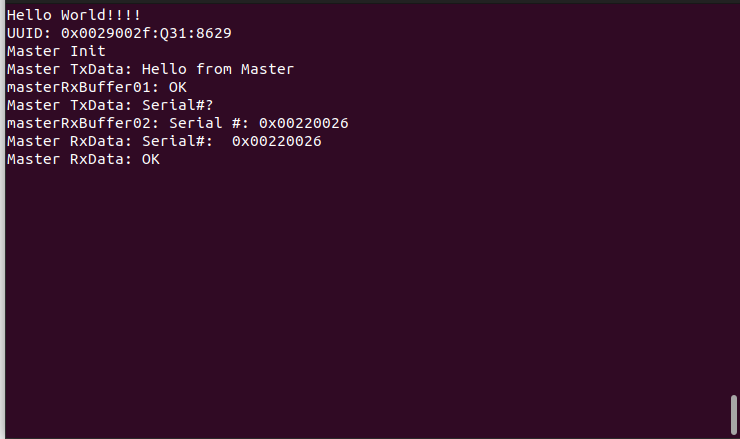
USART1 Dumb Terminal Output for Slave Bluetooth
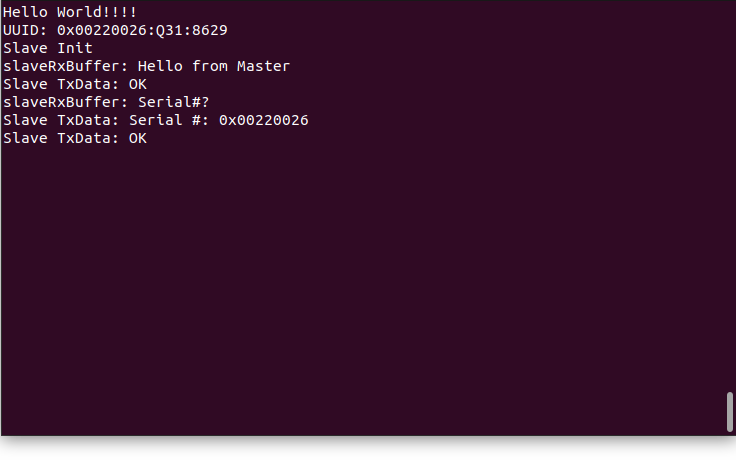
Logic Analyzer Output
The channels and the descriptions are in the columns on the left side of the screen.
